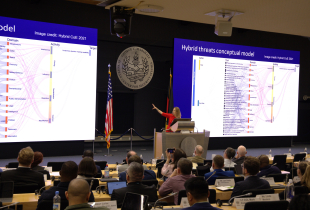Representatives from Western African Nations Convene for Seminar Aimed at Promoting International Security in Cyberspace
The George C. Marshall European Center for Security Studies Program on Cyber Security Studies, in cooperation with the U.S. Department of State’s Bureau of Cyberspace and Digital Policy and the German Federal Foreign Office, hosted the 2022 International Security in Cyberspace Seminar for ECOWAS Partners in Munich, December 5-9. The event brought together diplomats, cyber policy advisors, lawyers, and cybersecurity technical experts from 11 of the member-states of the Economic Community of Western African States (ECOWAS), plus officials from the ECOWAS Commission.
“The future of global security in cyberspace will require greater international cooperation and continued work on the implementation of the United Nations’ Framework of Responsible State Behavior in Cyberspace,” said Cmdr. Jonathan Odom, military professor of transnational security studies at the Marshall Center. “These topics were the key themes during the week-long gathering we had with cyber security practitioners, foreign policy experts, and other government officials.”
The seminar began with opening remarks from Ms. Liesyl Franz, the Acting Deputy Assistant Secretary of State in the Bureau of Cyberspace and Digital Policy at the U.S. Department of State and Mr. Felix Kroll, the Deputy Head of the Cyber Policy Coordination Staff at the German Federal Foreign Office. Both officials gave a brief overview of their country’s approaches to promoting responsible state behavior in cyberspace. “Through the establishment of our Bureau, the administration made it clear that the Department needed to elevate, integrate and institutionalize the work that we had been doing internationally for more than a decade on cyber and digital economy policy,” said Franz.
Over the five-day event, professors, cyber diplomats, and policy experts delivered a series of lectures, presentations, and panel discussions on shared security challenges in cyberspace to participants from national governments of western African countries.
“The technical challenges are of course fundamental, but the policy and legal challenges are equally important to addressing the threat,” said Amb. Eric Nelson, Ambassador-in-Residence at the Marshall Center. “We have been doing this for three decades now—building capacity among emerging democracies to deliver security to citizens.”
Many of the course discussions focused on the Framework of Responsible State Behavior in Cyberspace, developed over the last decade, by which all U.N. member states have committed to be guided. The Framework consists of application of international law in cyberspace, commitment to voluntary peacetime norms in cyberspace, and adoption of confidence-building measures in cyberspace.
Course participants heard from diplomats who have been instrumental to the Framework process, including both the development of these elements as well as its implementation at the national, regional, and global levels. Academics and government officials also facilitated small-group discussions during which participants reflected on what these cyberspace security challenges mean for their countries. Groups discussed practical next steps to address these challenges as well as the role of foreign policy in responding when states fail to live up to their commitments to the Framework.
The course included a table-top exercise, during which participants addressed a realistic, but fictitious, scenario involving cyber incidents. Groups formed small teams to answer questions and reflect on lessons learned that could be applied to cyber policy in their respective nations.
The 2022 International Security in Cyberspace Seminar for ECOWAS Partners was the latest in a series of cooperative engagements between the State Department’s Cyberspace and Digital Policy Bureau and the Marshall Center’s Program on Cyber Security Studies, with the goals of building partner capacity in cyber security and promoting collaborative approaches to shared security challenges in cyberspace.
